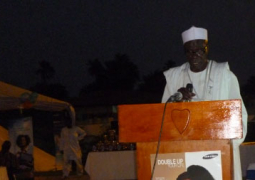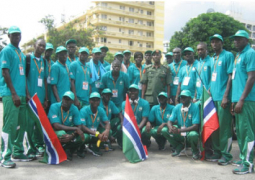Aspuna
Gambia Ltd, a cassava value chain association, on 8 September 2016 signed a
Memorandum of Understanding with the Department of Agriculture (DOA) and the
National Agriculture Research Institute (NARI), on building a factor that would
be processing cassava for export and domestic consumption, as well as multiply
the cassava cutting generated from agriculture.
Dr
Demba B. Jallow, NARI deputy director general, in his welcome remarks, said
Aspuna’s intervention was in line with government’s blueprint, as well as the
global cassava development strategy and implementation plan.
The
object is to counter the negative trend of cassava in food and cash crop
agriculture by using demand-driven approach to promote and develop
cassava-based industries, with the assistance of groups and individuals
interested in developing the cassava industry, Dr Jallow said.
He
added that Aspuna is here to complement that idea.
He
explained that Aspuna would build their factory here and to process cassava
with the flour to remain in the country, while the starch would be exported,
adding that Aspuna is here to help develop the cassava industry.
Dr
Jallow described Aspuna’s coming as timely and important since food security
based on import is becoming a challenge in Africa.
The
NARI depty DG also said that Aspuna’s coming would help improve the living
conditions of farmers.
“Cassava
is what we should look for because it is an easy crop to handle,” he further
stated, while describing it as a tolerant crop to many harsh climatic
conditions and performs well in poor soils.
“If
we are looking for an alternative in the face of climate chance cassava is the
best crop for us,” he concluded.
Sariyang
MIC Jobarteh, deputy Director General at DOA, described the signing as an
important in the history of agriculture in the country.
He
highlighted the importance of public-private partnership, saying the economy of
a country could not develop without the intervention of the private sector.
Government
has implemented policies to improve and increase food production and security
in the country, he pointed out.
Aspuna’s
intervention in cassava and its related activities is very important, he noted,
and he thanked and encouraged them to do their best, saying DOA and NARI are
behind them.
He
also encouraged others to emulate Aspuna as the venture is a noble one for
agriculture in the country.
“We
can only be independent if we have our food basket secured internally,” Mr
Jobateh remarked, saying it is high time they look internally and try to engage
in productive agriculture.
Aspuna
Gambia Ltd Country Director, Amadou Jah, in his statement, said they intend to
process all Gambian products as they want to see food self-sufficiency in the
country, as well as promote ‘grow what we eat’ and ‘eat what we grow’.
According
to him, their intention is to make cassava a cash crop to enable farmers have
food on their tables, as well as what to export.
Farmers
are the backbone of any country, he stated, saying promoting farmers is
promoting themselves.
Mr
Jah said they have located customers who would buy up to 800 tonnes of cassava.
Absa
Jaw, NARI Director of Research, in her closing remarks, thanked Aspuna for
their partnership, saying that was what they were looking for - public-private
partnership.
They
hope the partnership would continue, as well as expand to other regions of the
country, she concluded.
Read Other Articles In Article (Archive)




